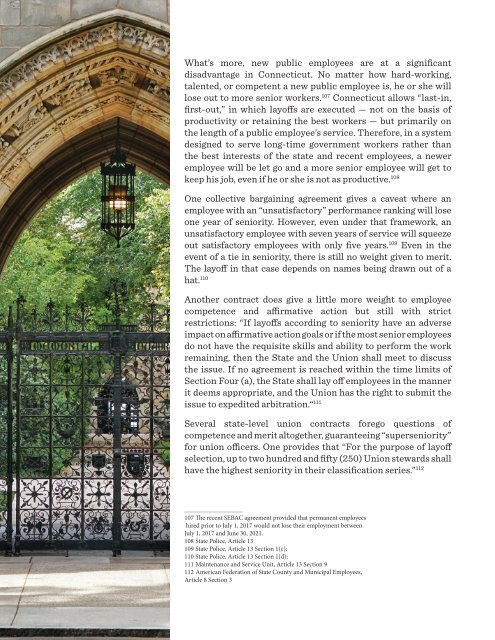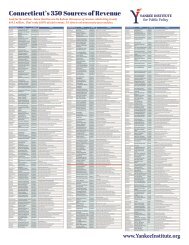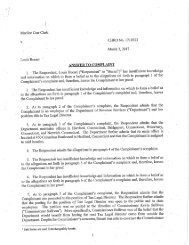Yankee - Above The Law - FINAL
You also want an ePaper? Increase the reach of your titles
YUMPU automatically turns print PDFs into web optimized ePapers that Google loves.
What’s more, new public employees are at a significant<br />
disadvantage in Connecticut. No matter how hard-working,<br />
talented, or competent a new public employee is, he or she will<br />
lose out to more senior workers. 107 Connecticut allows “last-in,<br />
first-out,” in which layoffs are executed — not on the basis of<br />
productivity or retaining the best workers — but primarily on<br />
the length of a public employee’s service. <strong>The</strong>refore, in a system<br />
designed to serve long-time government workers rather than<br />
the best interests of the state and recent employees, a newer<br />
employee will be let go and a more senior employee will get to<br />
keep his job, even if he or she is not as productive. 108<br />
One collective bargaining agreement gives a caveat where an<br />
employee with an “unsatisfactory” performance ranking will lose<br />
one year of seniority. However, even under that framework, an<br />
unsatisfactory employee with seven years of service will squeeze<br />
out satisfactory employees with only five years. 109 Even in the<br />
event of a tie in seniority, there is still no weight given to merit.<br />
<strong>The</strong> layoff in that case depends on names being drawn out of a<br />
hat. 110<br />
Another contract does give a little more weight to employee<br />
competence and affirmative action but still with strict<br />
restrictions: “If layoffs according to seniority have an adverse<br />
impact on affirmative action goals or if the most senior employees<br />
do not have the requisite skills and ability to perform the work<br />
remaining, then the State and the Union shall meet to discuss<br />
the issue. If no agreement is reached within the time limits of<br />
Section Four (a), the State shall lay off employees in the manner<br />
it deems appropriate, and the Union has the right to submit the<br />
issue to expedited arbitration.“ 111<br />
Several state-level union contracts forego questions of<br />
competence and merit altogether, guaranteeing “superseniority”<br />
for union officers. One provides that “For the purpose of layoff<br />
selection, up to two hundred and fifty (250) Union stewards shall<br />
have the highest seniority in their classification series.” 112<br />
107 <strong>The</strong> recent SEBAC agreement provided that permanent employees<br />
hired prior to July 1, 2017 would not lose their employment between<br />
July 1, 2017 and June 30, 2021.<br />
108 State Police, Article 13<br />
109 State Police, Article 13 Section 1(c);<br />
110 State Police, Article 13 Section 1(d);<br />
111 Maintenance and Service Unit, Article 13 Section 9<br />
112 American Federation of State County and Municipal Employees,<br />
Article 8 Section 3







